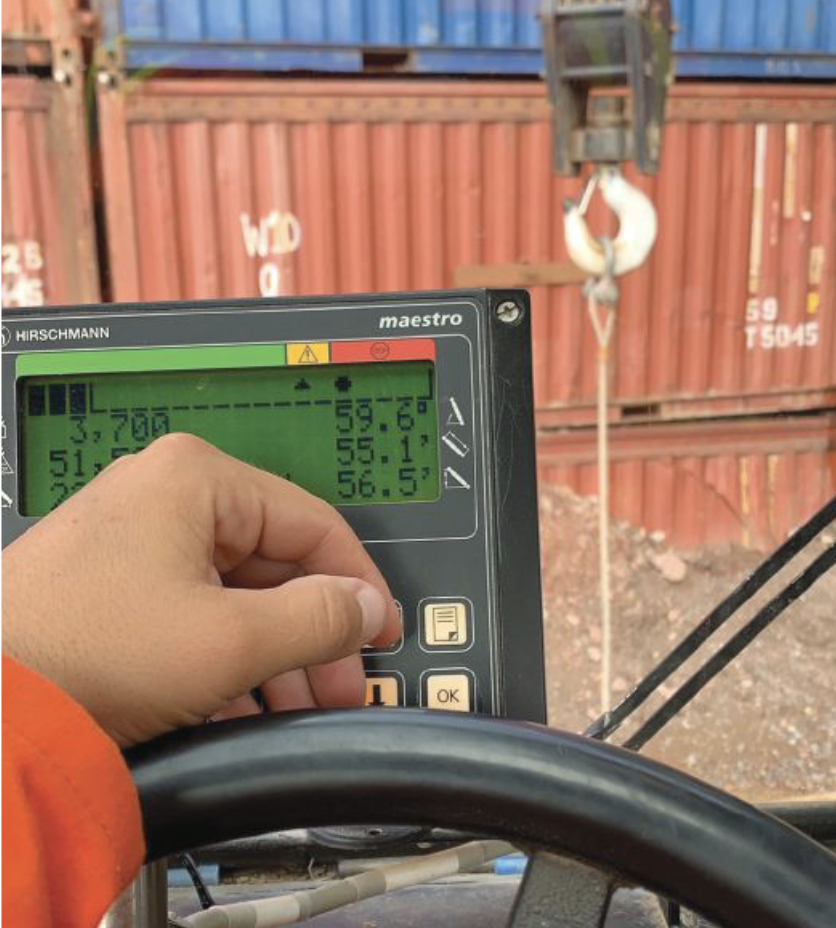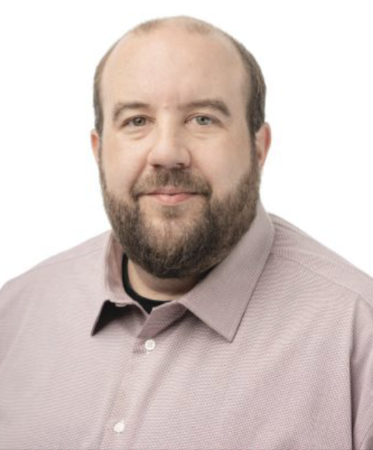
Features
Safety & Risk Management
Workforce
Crane industry grapples with a new understanding of mental health
March 18, 2024 By Matt Jones
 While Denika Mitchelmore struggles with OCD, anxiety and depression, she says that her mental health is never better than when she’s enjoying this view from the cab of her crane.
While Denika Mitchelmore struggles with OCD, anxiety and depression, she says that her mental health is never better than when she’s enjoying this view from the cab of her crane. On the surface, Denika Mitchelmore appears to have everything perfectly together.
In 2020, she became the first female level 3 offshore crane operator in Atlantic Canada while working at the West Aquarius oil rig in Newfoundland. She’s had a productive career in the crane industry, working both as an operator and providing training. And she’s living her dream, after having become fascinated with cranes at age 17 (for more on Mitchelmore’s career, see CHC May/June 2020).
But the surface does not tell the entire story.
“I struggle a lot with it,” says Mitchelmore. “This industry can be very hard on the head, but it’s not necessarily on the head, it’s emotionally too.”
Mitchelmore was not always so forthcoming about her manic obsessive-compulsive disorder (OCD), anxiety and severe depression. There was a time when she tried to keep it hidden.
“I wasn’t sure how people were going to react to it,” she says. “And coming from a small community, of only 80 to 100 people, you’re much more closed off because it’s unheard of in those communities. So, when I first got into the industry, I struggled with it.”
A growing awareness
For far too long, the standard approach to mental health issues was to ignore it – to pretend everything was alright and simply carry on. However, that has started to change.
“I have observed growing public interest and awareness around mental health over the past decade,” writes Dr. GiShawn Mance in the Howard University magazine. “Literacy around mental health has increased exponentially, coupled with the rise of public figures speaking openly and candidly about their challenges.”
With that increased interest and awareness, virtually all industries are grappling with what this new understanding of mental health means. But the crane industry is also in a particular inflection point as it relates to on-job stress which can often lead to mental health issues. While many workers, such as transport truck drivers, can relate to overseeing expensive and delicate cargo, and workers such as medical personnel can relate to being responsible for the health and safety of others, cranes are a rare case where the operators are responsible for both.
That includes not just a moral responsibility but also a legal responsibility – Canadian crane operators are responsible for the assembly, maintenance and inspection of their crane, along with the rigging and other attachments. And that’s not even talking about the stress operators feel when seeing dramatic examples of what can go wrong such as incidents in Seattle, Kelowna and Halifax in recent years.
“There’s the stress of doing things right, but there’s also different stresses that come on psychologically,” says Doug Younger, a former crane operator who now works with Worksafe BC. “Many crane operators are in and out of town, travelling for work, living in camps away from your family, especially through these times of COVID and hybrid work models. Those stresses of working for extended periods of time away from your home, you can go a bit squirrely, just speaking from my own experience.”
High-level impacts
Recent surveys conducted by Statistics Canada estimate that 33 per cent of workers in the construction industry reported poor mental health. A further 64 per cent of construction workers wish their employers did more to support mental health initiatives. Younger’s colleague Kira Berntson leads a psychological health and safety initiative for Worksafe BC which provides tools and training to officers doing inspections. She says they have seen an increasing number of claims related to metal health issues.
“We’re seeing a lot of injuries come out of things like psychological distress in the workplace, even if the injury itself is not psychological,” says Berntson. “People are distracted, they don’t have their whole head in the game necessarily and that does lead to injuries. Psychological injuries, when they happen, are some of the most long lasting and hardest to return to work from.”

Clinton Connell, executive director of BC Crane Safety, says that men, in particular, are often hesitant to speak of mental health issues due to fear of losing income or status.
“[The impacts on the industry] are very real,” adds Clinton Connell, executive director of BC Crane Safety. “I don’t believe it’s terribly different from any other sector. There’s a number of factors that lead into mental health conditions and people in the crane sector are just as susceptible to them as everybody else.”
Connell speculates that one of the biggest reasons why men specifically aren’t comfortable speaking about their mental health challenges is fear of reprisal – the fear of losing income or status.
Heather MacCallum, president of NCSG Crane & Heavy Haul, has made similar observations.
“What’s a little bit different about the crane industry is that level of toughness, masculinity and grit – the conversations aren’t as evolved in this space as maybe they are in some other areas,” says MacCallum. “I think it’s just as prevalent, if not more, because there hasn’t been access to resources or conversations to start to lift the weight that bears down on people operating in this industry.”
A participant in the Nova Scotia crane industry who spoke to Crane & Hoist Canada on the condition of anonymity, proposed that a person with open mental health struggles would not be able to work in the crane industry – not that they would be incapable of performing the work, but rather that the stigma around mental health would prevent them from being hired.
“If there’s a person who had mental health issues, or was struggling, and is then cleared to go back to work, if it’s known in the industry, they would find a reason to not take him,” said the source. “They would never ever admit that it was due to that. But it would just be ‘we don’t need anybody right now.’ They would find a way.”
However, those employers’ concerns don’t necessarily correspond with reality. While there are a wide variety of ways that mental health issues will impact someone’s life and livelihood, in her experience Mitchelmore says that the actual on the job work was never the cause of her challenges. It’s the other things that surround the work that can exacerbate her conditions.
“When I’m operating the crane, that’s when I feel the most calm, I feel the most focused,” she says. “That’s the best time my health ever is, because I’m passionate about it. I’m happy when I’m doing it, so I’m always focused.”
MacCallum also suggests that while much focus is directed at the impacts of mental illnesses, general mental health is just as important and can be triggered by a variety of factors.
“We see in the industry, and we experienced it as well at NCSG, an uptick in incidents – bumps, bruises, et cetera – in January and February,” says MacCallum. “A lot of that comes from seasonal affective disorder, the Christmas bills coming in, which all lands in the mental health spectrum as well. You’re just not at your peak, your mind is elsewhere and you’re worried about things.”
Varying responses
While it’s often tempting to view larger companies as unfeeling corporate behemoths and smaller companies as friendly, family-run extensions of the community, the responses of such companies to mental health issues don’t necessarily follow that pattern. For Mitchelmore, while working at larger companies she has felt that she was supported by her employers, but that wasn’t the case when she spent time working for a smaller company. During a period of difficult financial stress, her mental health struggles became almost insurmountable.
“I really had a bad spurt where I wanted to die,” says Mitchelmore. “I didn’t know how I was going to overcome this big situation of getting back on my feet again. So, like I do every time I have a moment, I sent the boss an e-mail. I offered that I could do this part time, because I need a more stable job with money coming in, but I never got a response. Not even so much as a ‘well, we hope you’re okay, is there anything I can do for you?’ You always think that in a smaller place that you support each other more, but in this case it was the bigger companies that supported me.”
Mitchelmore says it was the first time she had a negative experience with a company as it related to her mental health. In larger companies, she would occasionally encounter a co-worker who was insensitive, but she never had such issues with management.
“It was disheartening, because I went about it professionally,” she says. “I told him exactly what was going on, that I was drowning in debt and that my mental health had gone out the window and I don’t know what I’m going to do, and they never offered any assistance whatsoever. That was an eye-opener.”
Feeling that she lacked appropriate support, Mitchelmore eventually quit that position. Thankfully, she says that she feels much more supported by her current employer.
What gaps remain?
While there are a variety of support systems in place, this is an evolving conversation that will likely lead to further support programs. But exactly what form those programs will take is unclear. Speaking further on how fear of reprisal causes some to not seek help, Connell notes that an employer can provide a benefits program and life and family assistance programs, but they cannot guarantee that a worker’s income or employment won’t be disrupted if they need extended time off.

Heather MacCallum, NCSG Crane and Heavy Haul president hopes that discussions around mental healthcare become more normalized in the industry.
“Governments are putting some of these protections in place, but there’s that balance between the employer-employee relationship and the fact that the going concern needs to survive,” says Connell. “I see it as a balancing act. If you over-legislate it, there’s a fear that people will abuse the provisions. You don’t want to focus on the bad players because they’re the smallest percentage but there’s always a subset of bad players.”
Younger suggests a risk-management approach to the topic – that employers place a premium on psychological checks, to know their workforce and what makes them tick.
“Are there any factors that you can identify, not that someone needs to be pulled off the job, but maybe there’s something they need to be happy?” asks Younger rhetorically. “Maybe it isn’t an extra turnaround day at home, maybe it’s drug and alcohol rehab. Employers need to be cognizant and have those assessments in place to be able to identify those things early.”
Mitchelmore points to the intersectionality of the topic – these issues are even more pronounced if the person in question is, for example, being bullied on the job site for being gay or transgender. Her impression is that such support is often lacking in the wider industry. Mental health issues are compounded when a worker is experiencing that.
“I’ve known people to commit suicide because the way they live is not accepted,” says Mitchelmore. “Something the companies and government or wherever should be doing is education. If you see someone struggling, ask them if they need a hand; provide a mental health line for people, more tools to help people to get through the day.”
MacCallum hopes that as time goes on, and as more people from younger generations who are comfortable discussing mental health join the workforce, that these discussions become more normalized. Because mental healthcare isn’t something that has to relate to severe episodes – “it’s just part of living a healthy, normal life,” she says.
Print this page